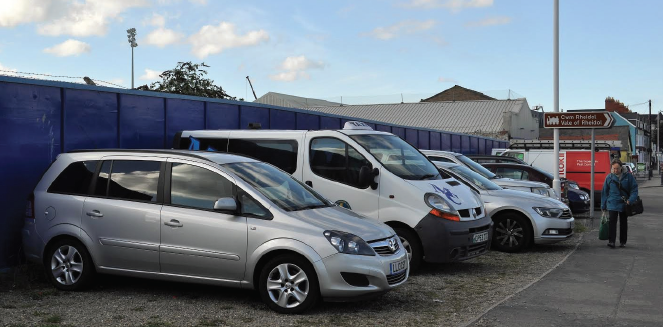
LAST week, Plaid Cymru called on the Welsh Government to set up a new fund to enable local authorities and community groups to offer free car parking in towns throughout Wales to support local shops and businesses. Plaid Cymru’s Assembly Member for Ceredigion, Elin Jones, has suggested that free parking in towns across Ceredigion could keep our town centres bustling.
Elin Jones told The Herald: “Wales has more empty shops on its high streets than the rest of the UK, and the Welsh Government could potentially support the high streets in order to keep them as a vibrant economic hub. We’ve seen the shape of our high streets change over the past few years. Places like Aberystwyth and Cardigan have seen a big turnover in shops. This may be down to more people moving online out of convenience. For example, foot fall in Aberystwyth is down by almost one-fifth since 2012. We need that extra incentive to get people in our towns, and free parking could do just that.”
Plaid Cymru’s Shadow Cabinet Secretary for Local Government, Sian Gwenllian, said: “By allowing local authorities and community groups to provide free parking for shoppers, we can help level the playing field for high streets and get shoppers back there. Plaid Cymru wants to see the Welsh Government set up a fund to help local authorities cover this cost. And we can do even more. We can lower business rates for small businesses and bring 70,000 of them out of paying rates altogether, and we can try to plug the £500 million funding gap that small businesses face by establishing a properly funded Welsh Development Bank, in order to lend to small businesses and help them grow. We can’t overlook how important the high street is for the well-being of a local area. A bustling high street often indicates a vibrant local economy, so it’s important that we do all we can to save the high street.”
WIDESPREAD CONCERN
Over the past year, the number of people shopping on the high street has declined UK-wide, posing a major problem for retailers. Fuelling that problem are said to be worries about the economic outlook, and most recently concerns over Brexit, combined with an increase in shopping on the internet. While expenditure in retail outlets declines, however, people are still spending their increasing disposable income on leisure and eating out. Overall footfall was down 0.9% in the first quarter of 2016 compared with the same period a year ago, according to analysts from Ipsos Retail Performance. However, some cities and towns are doing much worse than this national average suggests. In England, the worst performers are Newcastle upon Tyne, with shopper numbers down a hefty 9.95% and Stoke-on-Trent, down 8.1%. Compare these with Elin Jones’ claim that Aberystwyth footfall is down by 20% and it puts the town’s problem in startling perspective.
Across the UK even discount chains such as Poundland are feeling the pinch, with sales slowing. According to the Local Data Company, in April this year across the UK, some 46,000 shops stood empty, with approximately one-third of those have been so for more than three years. The national vacancy rate stood at 12.5%. With free parking, easy access and more space, retail locations outside of town centres are increasingly popular among those shoppers not filling their baskets online. The Office for National Statistics reported online sales rising almost 9% in March compared with the previous year. And online stores accounted for 13.2% of all retail sales. Famously, Mary Portas attempted to spark a resurgence of high street shopping in provincial towns. Places that have paid attention to shoppers’ needs, and so improved facilities, have managed to maintain footfall.
CARMAGEDDON!
Back in 2011 through to 2012, Aberystwyth conducted its own involuntary experiment in radical free car parking, which left our own special little skid-mark in the history books. Lest we forget, a bureaucratic mix-up between Dyfed-Powys Police and Ceredigion County Council resulted in there being no traffic warden employed for a year. By many accounts, the result was chaos. However, some retailers did report that the experiment was good for business. If that 12 months was chaotic and did cause some people inconvenience at times, civilisation as we know it did not end and the town survived. Unfortunately, at least to The Herald’s knowledge, the experience of the community self-managing parking was not documented in terms of the extra parking places that were creatively carved out of the urban landscape without undue disruption. Neither was the impact on retail businesses measured for comparison. To credit our competitors where that is due, the Cambrian News’ Street of Shame feature, where badly parked cars were pictured with their registrations revealed, surely aided in the community’s efforts to deal with the antisocial in ourselves. Overall, for at least some people, it was quite an entertaining year.
IDEAS FOR ABER?
‘Carmageddon’, as christened by that esteemed periodical The Daily Mail, has little to do with Plaid Cymru and Elin Jones’ suggestion for doing away with paying for parking in towns. But is free parking relevant in Aberystwyth? We do not, after all, have parking metres or ticket machines on the streets of the tow, but rather parking that is limited to two hours, one hour or the deadly thirty minutes. Free parking in local authority car parks further out of town might conceivably lessen the load on the streets, however. Plaid Cymru’s proposal is for the Welsh Government to contribute to the provision of such free parking. They do not expect County Councils to provide a ‘freebie’ and therefore have to cut other services any further. It does, of course, cost a significant amount of money to maintain any car park, free or otherwise.
Current difficulties in Aberystwyth have certainly been exacerbated by the loss of the Mill Street car park which had 265 spaces. Ironically, the retail development on the site of the Mill Street car park is likely to put further pressure on some hard pressed retailers in the town. When it opens, however, the new £40 million development will have 555 spaces and will be by far the biggest car park Ceredigion has ever seen.
The Herald understands that it is written into the contract for the Mill Street site that the parking spaces will be free and allocated on a three-hour basis. There is an option to reduce this to two hours if the car park becomes 85% full. Moreover, there is no compulsion for those parking in the new car park to shop at M&S or Tesco.
Shoppers can still go into town to buy their underwear and groceries. To turn a famous slogan around, for our local retailers, every little helps.
Coincidentally, then, even as Plaid Cymru suggest more free parking, Aberystwyth is on the verge of getting an extra 290 parking places compared with before the Mill Street development. Tesco is on schedule to open before the end of November, with the car park opening perhaps a fortnight before that. M&S is set to open in spring 2017. Whether encouraging more cars into town makes sense from a retail point of view or not, it certainly is not good news in terms of cutting carbon emissions to mitigate climate change nor in reducing local pollution. Town and County Councillor Mark Strong told The Herald: “I’m not in favour of free car parking. I am not convinced it will help increase footfall and in my opinion will encourage car use.” Mark Strong is concerned that more cars will mean more congestion and more pollution and so would actually put people off visiting towns like Aberystwyth.
If Ceredigion could come up with a scheme to benefit those coming into town to shop with a car full of people and/or penalising drivers who travel solo, that might make good sense. Similarly, if parking privileged smaller eco-friendly cars over big fat gas guzzlers, that could work to create space and reduce pollution. Some models of car on the road in 2016 were definitely not designed to be driven on narrow Welsh roads, nor small town streets. To help local retailers, however, radically lowering business rates might be the most supportive thing Ceredigion could do. Herald readers, especially local retailers themselves, are welcome to suggest other measures by writing to our letters page. Readers may also like to suggest a name for the Mill Street Development. Suggestions that we have received already range from the architecturally critical through the politically bitter (ill feeling over the demolition of the day centre and people’s homes refuses to go away) to the more constructive and forward looking. But what do you think?
















Add Comment